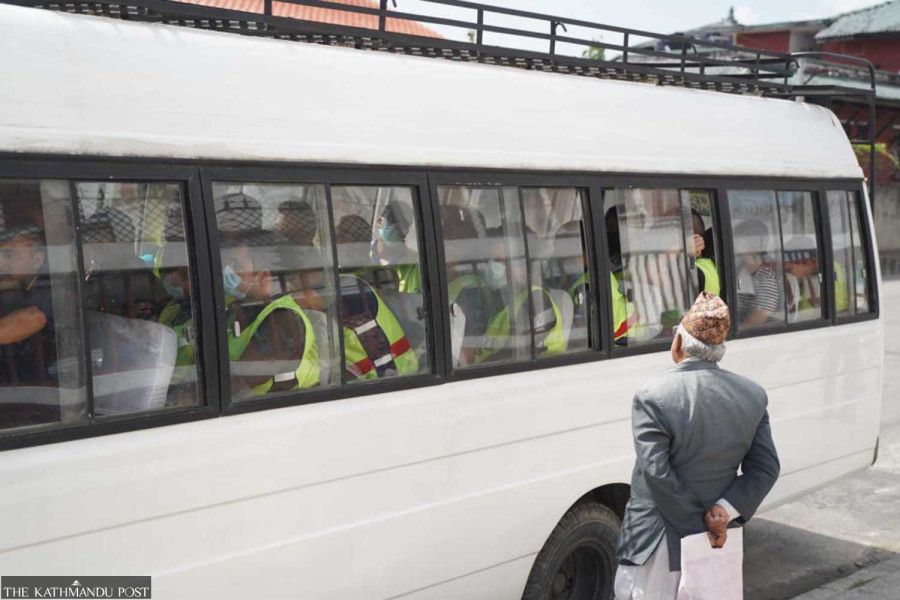National
Police reveal transnational and political ties in gold smuggling
Central Investigation Bureau for initially prosecuting 29 individuals over 60kg gold case.
Prithvi Man Shrestha
Police on Wednesday said the 60kg gold seized in July was linked to a large-scale smuggling racket orchestrated by a group of Chinese nationals whose connections extend from Hong Kong to Nepal and India.
The Central Investigation Bureau (CIB) of the Nepal Police on Wednesday submitted its investigation report to the District Attorney Office, Kathmandu asking the latter to prosecute 29 individuals—Nepali and foreigners—in connection with the July seizure.
According to the CIB, at least one Chinese national having political connections in Nepal was involved in the smuggling, raising questions about the broader involvement of political leadership.
Earlier, police had found that Daojin Wang, who has been charge-sheeted in a separate 9 kg gold smuggling case, had multiple contacts with former Speaker Krishna Bahadur Mahara, who is also the CPN (Maoist Centre) vice-chair. Wang has been identified as one of the key members of the racket involved in the recent 60kg gold smuggling case.
“We don’t speak about the involvement of any VIPs in the smuggling unless there is concrete evidence,” said Additional Inspector General Kiran Bajracharya, who is also the chief of the CIB, at a press meet organised in Kathmandu on Wednesday before the investigation report was submitted to the District Attorney Office. “But what I can assure you is that the empire that they [the Chinese racketeers] had built with the backing of domestic elements has now crumbled.”
Police interrogated Rahul Mahara, son of the Maoist Centre vice-chair and former Speaker Mahara, and Dipesh Pun, son of former Vice-president Nanda Bahadur Pun, in connection with the 60kg gold smuggling case.
Besides Daojin, police have identified four other Chinese nationals including Feng Cheng Lin, Peng Lingfeng Xin, Peng Yongxin and Zhong Jingchuan as masterminds of smuggling of gold via Nepal.
“They formed two different groups for melting and refining the gold, shaping it into desired forms and selling it in both domestic and Indian markets,” said Superintendent of Police Sanjay Singh Thapa of the CIB.
Police arrested a number of Chinese nationals involved in the two groups. One of them is Yao Pucheng, also known as Alex, who was earlier found involved in smuggling gold to India.
Chinese and Indian nationals were arrested in Operation Molten Metal launched in 2021 by India’s Department of Revenue Investigation, resulting in the seizure of 85.53 kg of smuggled gold, and Operation Golden Tap launched in 2022 that led to confiscation of 61.5kg of gold at Indira Gandhi International Airport.
“Three Chinese nationals including Alex have been linked to gold smuggling cases in India since 2019,” said Bajracharya. The racketeers, after conducting a market survey in India and finding potential buyers for smuggled gold, started smuggling gold into Nepal with the aim of taking it to the Indian market.”
Police revealed that gold smugglers based in India had paid their counterparts in Hong Kong directly using cryptocurrency, and transactions were also made using digital wallets such as Alipay, AntPay, GlobePay, Winpay.
In order to sell the smuggled gold, the racketeers provided digitally generated code to the customers of the gold and based on which Nepal-based racketeers identified the buyers and supplied the gold to them.
According to police, it has not been long since these racketeers used Nepal as a transit country for smuggling gold. “These Chinese racketeers had registered seven firms in Nepal in September 2022 that received smuggled gold and melted it and sold it in the market,” CIB Chief Bajracharya said.
Dawa Chhiring, a Belgian citizen of Tibetan descent and operates a hotel in Thamel, has been identified as a key figure in Nepal. He helped the racketeers by creating a conducive environment for gold smuggling, helping with payments, and provided them a hiding place after seizure of the gold.
Another member of the racket is Thapten Tsering, who was involved in setting up the business firms. Harka Raj Rai, who received the seized 60 kg gold, also helped the gang in finding ordinary Nepalis under whose name the companies would be registered.
For example, Ready Trade Pvt Ltd, which was responsible for bringing the seized gold, was registered under the name of one Dilip Bhujel of Dolakha.
Police said that gold was smuggled through these firms under the guise of electronic goods.
Police said they completed the investigation connected only to Ready Trade Pvt Ltd. “Investigation is underway to verify the details of gold imported through five other firms,” said SP Thapa. “The consignment imported by one of the firms, however, could not get customs clearance at the TIA.”
Even though 60.789kg of gold concealed as motorcycle brake pads was seized on July 18, police have recommended prosecuting the accused with smuggling a total of 362.677kg of gold.
After the July 18 seizure of gold smuggled in the form of brake pads, police had raided a warehouse in Kathmandu and seized several cartons of brake pads. After examining those brake pads, police estimated that an additional 302.062kg of gold had also been smuggled into Nepal in the same fashion. Thus, the police concluded that the racketeers had smuggled a total of 362.778kg of gold worth Rs3.5 billion and recommended the prosecution of the accused accordingly, according to CIB press statement.
According to the CIB, they recommended prosecuting 25 of the 32 people arrested in connection with the case, and four among the 18 people who are at large.
“We recommended not to prosecute seven people among those arrested as they were found not involved in the crime and did not benefit from the scam,” a senior police officer involved in the investigation told the Post.




 16.12°C Kathmandu
16.12°C Kathmandu














